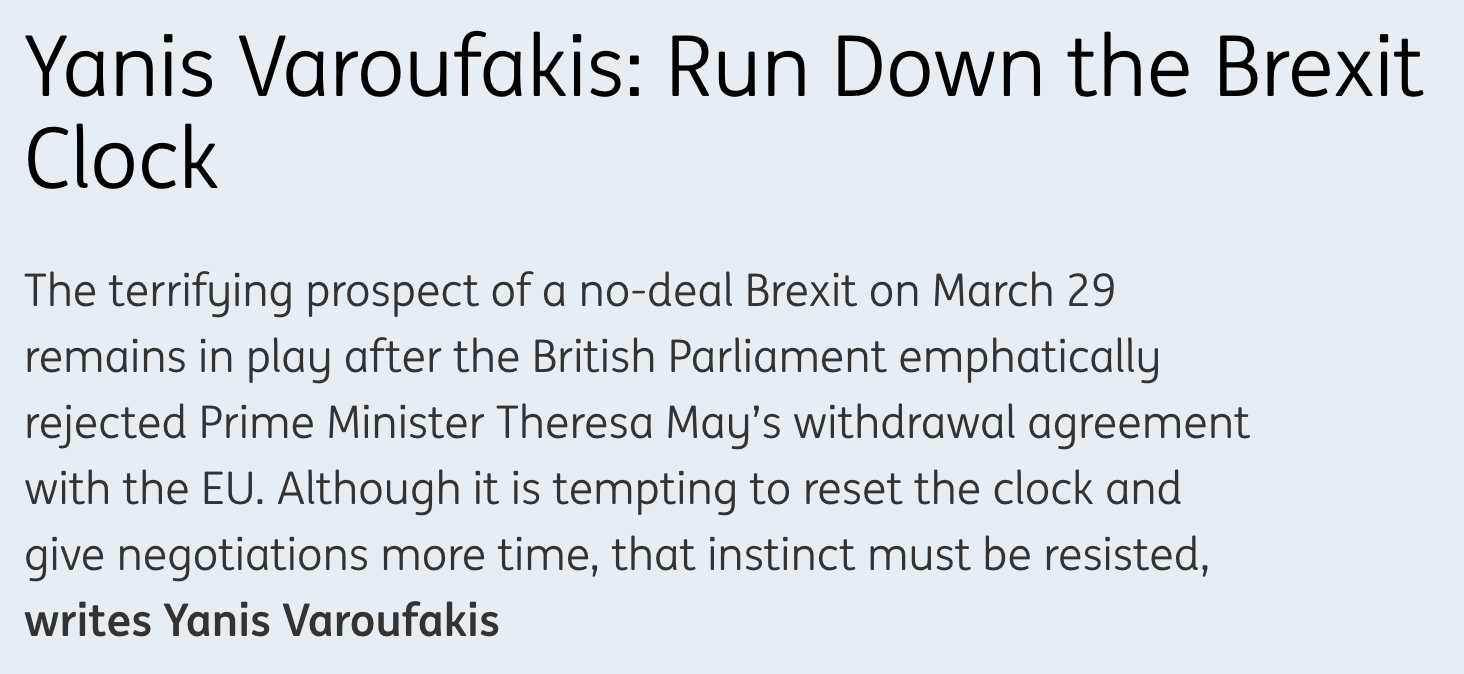The overwhelming defeat that Britain’s Parliament inflicted upon Prime Minister Theresa May’s Brexit plan was fresh confirmation that there is no substitute for democracy. Members of Parliament deserve congratulations for keeping their cool in the face of a made-up deadline. That deadline is the reason why Brexit is proving so hard and potentially so damaging. To resolve Brexit, that artificial deadline must be removed altogether, not merely re-set.Leaving the European Union is painful by design. The process any member state must follow to exit the EU is governed by Article 50 of the bloc’s Lisbon Treaty, which, ironically, was authored by a British diplomat keen to deter exits from the EU. That is why
Topics:
Yanis Varoufakis considers the following as important: Brexit, DiEM25 UK, English, Project Syndicate
This could be interesting, too:
Robert Skidelsky writes The Roots of Europe’s Immigration Problem – Project Syndicate
Robert Skidelsky writes Britain’s Illusory Fiscal Black Hole
Robert Skidelsky writes The Enduring Appeal of Live Performance
Robert Skidelsky writes The Language of Political Control

 The overwhelming defeat that Britain’s Parliament inflicted upon Prime Minister Theresa May’s Brexit plan was fresh confirmation that there is no substitute for democracy. Members of Parliament deserve congratulations for keeping their cool in the face of a made-up deadline. That deadline is the reason why Brexit is proving so hard and potentially so damaging. To resolve Brexit, that artificial deadline must be removed altogether, not merely re-set.Leaving the European Union is painful by design. The process any member state must follow to exit the EU is governed by Article 50 of the bloc’s Lisbon Treaty, which, ironically, was authored by a British diplomat keen to deter exits from the EU. That is why Article 50 sets a two-year negotiation period ending with an ominous deadline: If negotiations have not produced a divorce agreement within the prescribed period – March 29, 2019, in Britain’s case – the member state suddenly finds itself outside the EU, facing disproportionate hardships overnight.
The overwhelming defeat that Britain’s Parliament inflicted upon Prime Minister Theresa May’s Brexit plan was fresh confirmation that there is no substitute for democracy. Members of Parliament deserve congratulations for keeping their cool in the face of a made-up deadline. That deadline is the reason why Brexit is proving so hard and potentially so damaging. To resolve Brexit, that artificial deadline must be removed altogether, not merely re-set.Leaving the European Union is painful by design. The process any member state must follow to exit the EU is governed by Article 50 of the bloc’s Lisbon Treaty, which, ironically, was authored by a British diplomat keen to deter exits from the EU. That is why Article 50 sets a two-year negotiation period ending with an ominous deadline: If negotiations have not produced a divorce agreement within the prescribed period – March 29, 2019, in Britain’s case – the member state suddenly finds itself outside the EU, facing disproportionate hardships overnight.
This rule undermines meaningful negotiations. Negotiators focus on the end date and conclude that the other side has no incentive to reveal its hand before then. Whether the allotted negotiation period is two months, two years, or two decades, the result is the same: the stronger side (the European Commission in Brussels in this case) has an incentive to run down the clock and make no significant compromises before the eleventh hour.
Any resetting of the clock would simply extend the paralysis, not speed up convergence toward a good agreement. Giving May another three months, or even three years, would do nothing to create incentives to reveal hidden preferences or to drop fictitious red lines.
To synthesize competing views into one coherent position, Britain needs more than a voting scheme: it needs a People’s Debate that the ticking clock makes impossible, even if reset. The standstill and the phoney negotiations will thus come to an end only if the made-up deadline is allowed to expire by a Parliament willing calmly to say “no” to unacceptable deals negotiated by May and the EU. Allowing the clock to run down is now a prerequisite for resolving the Brexit conundrum.
